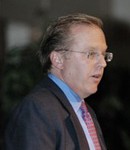The John H. Updike Literary Trust announced yesterday that James Schiff will edit a volume of John Updike’s letters, with a target completion date of 2020. A publisher has not yet been named.
 Anyone familiar with Updike studies knows that this is good news on several counts. The decision to release a collection of letters comes after years of the Literary Trust saying it would not permit them to be published. The reversal opens the door to not just a single published volume, but more, as happened in Hemingway studies when an initial Selected Letters edited by Princeton scholar Carlos Baker led to several thematic volumes of correspondence before the complete letters were (and are still being) published in a multi-volume set. Updike, like Hemingway, was a prolific letter-writer who was generous with his comments, producing hundreds of what are typically described in the autograph world as “content letters.” A volume of published letters always sparks new reader interest in an author and gives scholars additional material with which to work and find inspiration for new insights, essays, and books.
Anyone familiar with Updike studies knows that this is good news on several counts. The decision to release a collection of letters comes after years of the Literary Trust saying it would not permit them to be published. The reversal opens the door to not just a single published volume, but more, as happened in Hemingway studies when an initial Selected Letters edited by Princeton scholar Carlos Baker led to several thematic volumes of correspondence before the complete letters were (and are still being) published in a multi-volume set. Updike, like Hemingway, was a prolific letter-writer who was generous with his comments, producing hundreds of what are typically described in the autograph world as “content letters.” A volume of published letters always sparks new reader interest in an author and gives scholars additional material with which to work and find inspiration for new insights, essays, and books.
It’s also good news that James Schiff was chosen to edit the volume. As editor of The John Updike Review and cofounder and current vice-president of The John Updike Society, Schiff is well positioned to collect and edit the interviews. An associate professor of English at the University of Cincinnati, Schiff is also known in the Updike world for his three books: Updike’s Version: Rewriting the Scarlet Letter (1992), John Updike Revisited (1998), and Updike in Cincinnati: A Literary Performance (2007).
“Updike was a masterful and prolific letter writer, and so it pleases me greatly to be working on this project,” said Schiff, who has already begun collection letters from institutional libraries and requesting them from private owners and recipients. The letters span six decades of Updike’s life, from his teens in postwar rural Pennsylvania to his seventies, when he was revered as one of America’s most accomplished and honored men of letters.
“Collecting the staggering number of extant letters will take time,” Schiff said. “Yet it is already clear that these writings have literary and biographical significance. Updike is a major figure in American literature, and his letters reveal yet another aspect of his literary genius.”
Schiff said he would be grateful to hear from anyone in possession of Updike’s correspondence. He can be reached at james.schiff@uc.edu or updikeletters@gmail.com.
 The John Updike Letters Project
The John Updike Letters Project